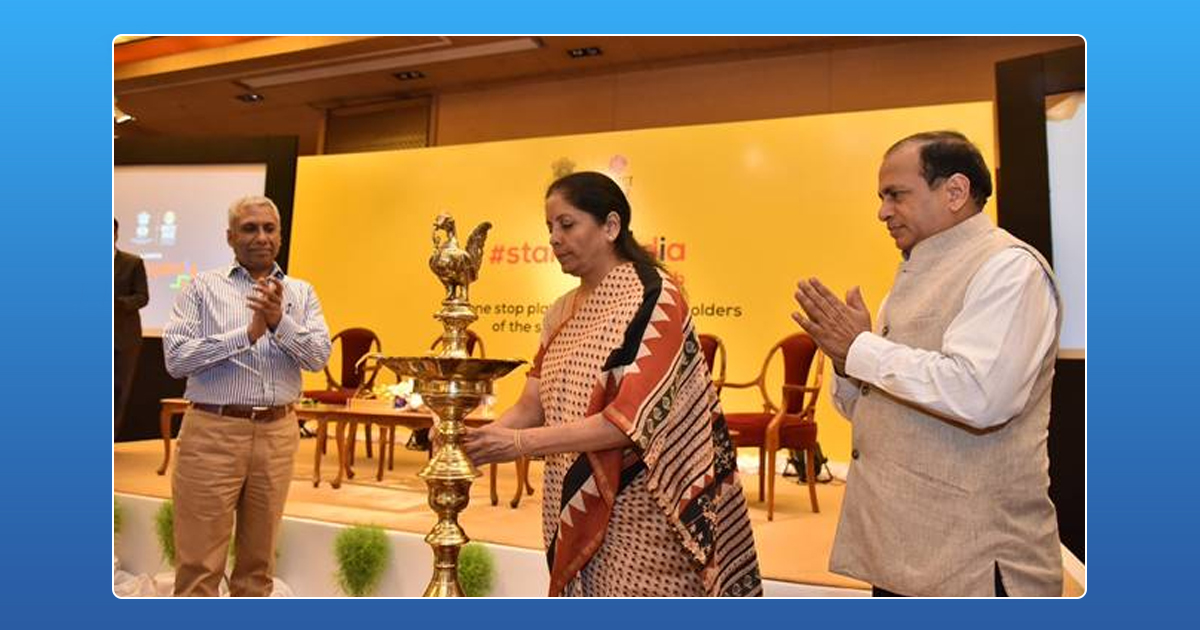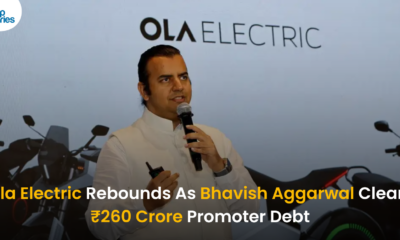Latest News
Government of India Launches Startup India Hub

The Government of India announced the launch of Startup India Hub, a virtual platform for all stakeholders of the entrepreneurial ecosystem in the country. Union Commerce & Industry Minister Nirmala Sitharaman inaugurated the hub for all startups to discover, connect and engage with each other.
Speaking during the inauguration of the Startup Hub, Minister Nirmala Sitharaman encouraged all entrepreneurs in India to utilize the portal and asked the stakeholders to contribute to the platform as much as possible. “We are here to help you, we want you to succeed,” she added.
The portal will host startups, investors, funds, mentors, academia, incubators, accelerators, corporates, government bodies, and more in order to be a dynamic and interactive platform. Startup Hub which was operational for the past one month in its pilot phase already has 500 stakeholders including 91springboard, a-IDEA, Aim Smart City, Amazon and more.
This Hub will attempt to solve problems by using an open API architecture allowing seamless integration of content from government and private stakeholder. Ramesh Abhishek, Secretary DIPP, Deepak Bagla, CEO of Invest India and Rajeev Aggarwal, Joint Secretary DIPP were also a part of the inauguration.
This new initiative is a follow-up of the Startup India initiative launched by PM Narendra Modi in January 2016 and will fall under the official Investment Promotion and Facilitation Agency of the Government of India. To encourage and ensure accessibility, a dedicated app will also be available on iOS and Android devices.
Minister Nirmala Sitharaman added that India is the third largest startup ecosystem with three to four startups being launched daily. She also announced the government’s initiative to garner international exposure for Indian startups and facilitate better exchange of ideas through a Startup Exchange Program between the SAARC nations.
A panel discussion on ‘Navigating the startup ecosystem’ in April 2016, kick-started the launch of the Startup India Hub. The platform is also set to aggregate schemes available across various state governments in its next phase.
Latest News
Peak XV New Funds: $1.3B Commitment for India Startup Surge 2026

Peak XV Partners has launched three new funds totaling $1.3 billion, targeting India’s booming startup ecosystem. The lineup features the $600M Surge fund (8th edition) for early-stage ventures, a $300M Growth Fund for Series B+ scaling, and a $400M Acceleration Fund for rapid portfolio expansion. This commitment arrives as India’s VC inflows rebound, with AI and fintech leading 2026 trends.
These funds build on Peak XV’s legacy of backing unicorns like Zomato and Pine Labs, offering founders capital plus strategic guidance amid post-winter recovery. Early-stage deals surged 20% last year per Tracxn, positioning Peak XV to fuel the next wave of innovation in SaaS, climate tech, and consumer plays.
For startups eyeing Peak XV new funds or Surge fund 2026 applications, this signals prime opportunities. Investors and marketers should watch for deployment updates India remains a global VC hotspot.
Latest News
D2C Brand Neeman’s Raises $4 Million for Tier 2/3 Store Expansion & Eco-Friendly Shoes

Hyderabad, January 13, 2026 Neeman’s, India’s leading D2C footwear brand famed for sustainable shoes and patented PIXLL® technology, has raised $4 million from existing investors. This funding boosts its cumulative capital past $10 million since 2015, with a post-money valuation nearing $50 million. CEO Vijay Chahoria emphasized offline retail as the “next frontier,” planning 50+ new stores in Tier 2/3 cities like Jaipur and Lucknow to blend eco-friendly innovation with hands-on customer experiences.
In India’s booming D2C ecosystem where footwear sales hit ₹1.2 lakh crore in 2025 Neeman’s targets hybrid retail amid high online CAC and 25-30% returns. Backed by vegan, machine-washable shoes priced ₹2,000-4,000, the brand leverages PIXLL® (5x more breathable than leather) for carbon-neutral comfort. Recent 5x revenue growth to ₹100 crore ARR, 1M+ pairs sold via Myntra and stores, and awards at India D2C Summit 2025 position it ahead of rivals like Paaduks.
Neeman’s offline expansion India eyes the $15B sustainable footwear market by 2028, fueled by PLI schemes, Gen Z’s 70% eco-preference (Nielsen), and Southeast Asia exports. Challenges like real estate costs are offset by data-driven inventory and omnichannel QR tech. Watch for Q1 2026 launches in Hyderabad and Bengaluru redefining D2C success through authentic, “Wear the Change” branding.
Latest News
Centre Mulls Revoking X’s Safe Harbour Over Grok Misuse

The Centre is weighing the option of revoking X’s safe harbour status in India after its AI chatbot Grok was allegedly misused to generate and circulate obscene and sexually explicit content, including material seemingly involving minors. The IT Ministry has already issued a notice to X, directing the platform to remove unlawful content, fix Grok’s safeguards, act against violators, and submit a detailed compliance report within a tight deadline. If the government finds X’s response inadequate, it could argue that the platform has failed to meet due‑diligence standards under Indian law, opening the door to harsher action.
Under Section 79 of the IT Act, safe harbour protects intermediaries like X from being held directly liable for user‑generated content, provided they follow due‑diligence rules and promptly act on legal takedown orders. Revoking this protection would mean X and its officers could be exposed to criminal and civil liability for obscene, unlawful, or harmful content that remains on the platform, including AI‑generated images from Grok. This prospect significantly raises X’s compliance risk in India and could force tighter moderation, stricter AI controls, and more aggressive removal of flagged posts.
The Grok episode also spotlights the regulatory grey zone around generative AI, where tools can create harmful content at scale even without traditional user uploads. Policymakers are increasingly questioning whether AI outputs should still enjoy the same intermediary protections as conventional user posts, especially when they involve women and children. How the government ultimately proceeds against X over Grok misuse could set a precedent for AI accountability, platform responsibility, and safe harbour interpretation in India’s fast‑evolving digital ecosystem.














ny0dx
June 5, 2025 at 10:06 pm
where can i get generic clomid pill cost generic clomiphene prices cheap clomid without a prescription buy clomiphene no prescription clomid nz prescription where can i buy cheap clomid no prescription how to buy clomiphene without prescription
MM88
November 8, 2025 at 2:08 am
Khám phá thế giới giải trí trực tuyến đỉnh cao tại MM88, nơi mang đến những trải nghiệm cá cược thể thao và casino sống động.
GO88
November 9, 2025 at 9:20 am
Tham gia cộng đồng game thủ tại Go88 để trải nghiệm các trò chơi bài, poker phổ biến nhất hiện nay.
站群程序
November 9, 2025 at 8:52 pm
采用高效谷歌站群策略,快速提升网站在搜索引擎中的可见性与权重。谷歌站群
谷歌外推
November 12, 2025 at 9:50 am
采用高效谷歌外推策略,快速提升网站在搜索引擎中的可见性与权重。谷歌外推
iwin
November 19, 2025 at 5:48 am
iwin – nền tảng game bài đổi thưởng uy tín, nơi bạn có thể thử vận may và tận hưởng nhiều tựa game hấp
Kuwin
November 20, 2025 at 11:36 am
kuwin sở hữu kho game đa dạng từ slot đến trò chơi bài đổi thưởng, mang đến cho bạn những giây phút giải trí tuyệt vời.
J88
November 21, 2025 at 8:37 am
Đến với J88, bạn sẽ được trải nghiệm dịch vụ cá cược chuyên nghiệp cùng hàng ngàn sự kiện khuyến mãi độc quyền.
MM88
December 1, 2025 at 1:23 am
Với giao diện mượt mà và ưu đãi hấp dẫn, MM88 là lựa chọn lý tưởng cho các tín đồ giải trí trực tuyến.
kazino_s_minimalnym_depozitom
December 20, 2025 at 5:20 am
https://t.me/s/Kazino_s_minimalnym_depozitom